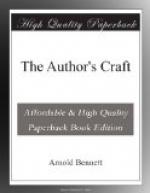My definition brings me to the sole technical difference between a play and a novel—in the play the story is told by means of a dialogue. It is a difference less important than it seems, and not invariably even a sure point of distinction between the two kinds of narrative. For a novel may consist exclusively of dialogue. And plays may contain other matter than dialogue. The classic chorus is not dialogue. But nowadays we should consider the device of the chorus to be clumsy, as, nowadays, it indeed would be. We have grown very ingenious and clever at the trickery of making characters talk to the audience and explain themselves and their past history while seemingly innocent of any such intention. And here, I admit, the dramatist has to face a difficulty special to himself, which the novelist can avoid. I believe it to be the sole difficulty which is peculiar to the drama, and that it is not acute is proved by the ease with which third-rate dramatists have generally vanquished it. Mandarins are wont to assert that the dramatist is also handicapped by the necessity for rigid economy in the use of material. This is not so. Rigid economy in the use of material is equally advisable in every form of art. If it is a necessity, it is a necessity which all artists flout from time to time, and occasionally with gorgeous results, and the successful dramatist has hitherto not been less guilty of flouting it than the novelist or any other artist.




